Never Lose Sight of Your Valuables; The Best GPS Trackers for 2024, Tested
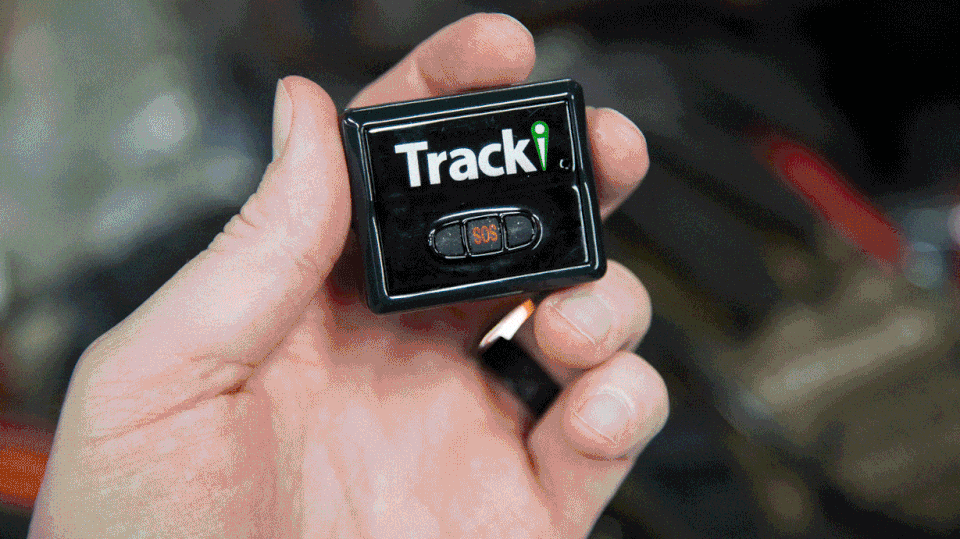
"Hearst Magazines and Yahoo may earn commission or revenue on some items through these links."
This article was updated in March 2024 with new products and information.
GPS trackers are changing how we monitor essential aspects of our lives. Whether you're a parent, a fleet manager, or someone who values their security, you will likely see value in a GPS tracker. These devices have evolved beyond simple tracking; they now offer apps, reports, and alerts, all customizable to your needs.
Despite possibly shady and downright unlawful applications (tracking a person without their consent is illegal in most states), GPS trackers have plenty of legal and reasonable uses. For example, parents use them to monitor a new driver's location and driving habits. They can provide peace of mind for caregivers of elderly drivers. Fleet managers use them to keep tabs on trucks and deliveries. And if your car gets stolen, a GPS tracker can locate it for law enforcement.
We've tested and reviewed some of the top trackers on the market to help you make the best decision for your needs. Which one should you buy?
Things to Consider When Shopping for a GPS Tracker for Cars
Subscription Cost
In most cases, a GPS tracker will require a monthly subscription cost. Some companies offer discounts for up-front bulk payments, so select the subscription that best suits you and your budget.
Battery Life
A GPS tracker will only report if there is power, so battery life is a key consideration. While this will vary widely, the general rule of thumb is that the more often the GPS reports, the shorter the battery life. We suggest setting the low-battery alert on your GPS tracker to avoid the no-battery problem.
Desired Use
You likely have a good idea of how you wish to use your GPS tracker. Let this inform your purchasing decision—consider what you are tracking and what you'd like to know. Hardwire options are for vehicle use only; battery-powered products provide monitoring solutions for all your belongings.
RELATED: The Best OBD-II Scanners, Tested
How We Evaluated GPS Trackers
When we ran these trackers through our Gear Team testing gauntlet, we noted the following parameters:
Reliability for triggering speed and geofence alerts
Data and features the tracker provides
Ease of Use
We tested each tracker on a test route featuring a gamut of possible GPS-tracker triggers, including an underground structure. (Interestingly, none of the trackers we tested dropped its signal, even five stories down.)
Next, we dug through each product's app and desktop versions, noting the alerts, reports, and notifications. To gauge the user experience, a tester familiar with the apps compared user-experience notes with another tester who had zero experience using them, evaluating each app's user interface and learning curve to usability.
We settled on a 2022 Ford Bronco Badlands (with a manual!) for this test. On our planned testing route, we had to navigate five stories in an underground parking garage, which proved a bit tricky thanks to the size of the Badlands but gave us the testing data we needed. That's right: We tested small, discreet devices in a vehicle that is anything but. Fitting, right?
Which GPS trackers performed best for various types of users? Here's what we found.
The Best GPS Trackers for Cars
Bouncie
Bouncie's effortless user experience makes it our choice for the Best Overall. Activating the device took mere moments since it has a true plug-and-play setup. After a quick 10-minute drive, we were good to go.
With a range of alert options like impact detection, curfew, and erratic driving, it was clear Bouncie has given sincere thought to what a typical person is looking for in a GPS tracker. The real star was its intuitive, easy-to-use app, which displays fuel levels, engine and battery health, and vehicle specs. It even features a space for insurance details.
One benefit to an OBD-connected GPS tracker is you don't have to worry about its battery dying. However, that convenience comes at a cost, since the Bouncie will only report while the car ignition is on.
Alerts:
Speed
Impact Detection
GeoZone
Rapid Acceleration
Hard Braking
Curfew
Trip Start and End
Fuel Level
Distance Driven
Idle Time
Trip Fuel Economy
Key Features:
Chronological Trip Log
15-Second Updates
Vehicle Health Monitors
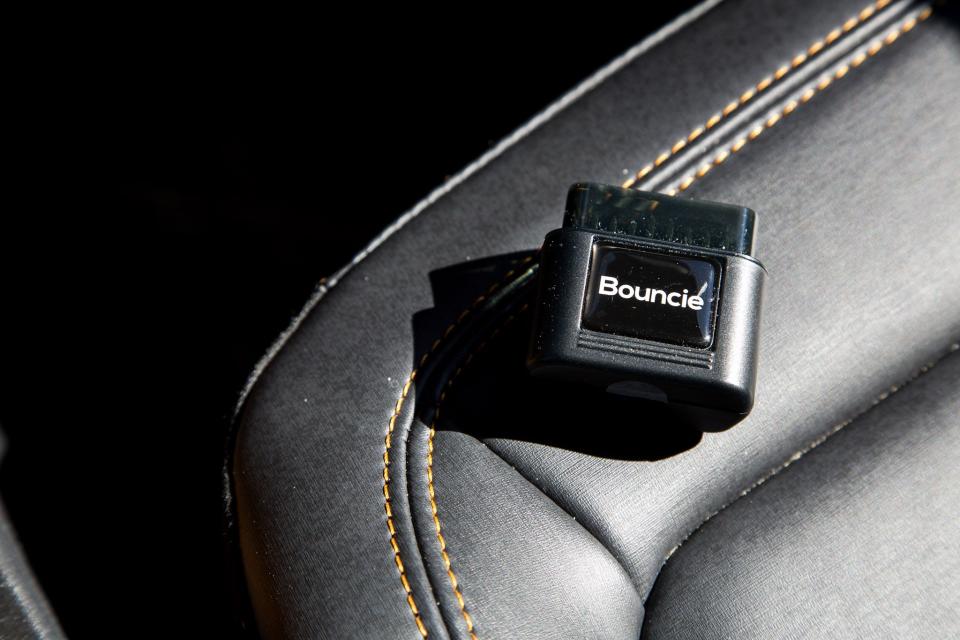
Bouncie
amazon.com
$89.99
Gannon BurgettTracki
With a belt clip, key chain, and magnetic accessory, the Tracki is as versatile as it is reliable. During the test we were delighted with the steady influx of alerts we received via email and text; the push notifications were less predictable.
This device has powerful reporting options, and you can easily customize the data that is important to you through the app or desktop. But what stands out about the Tracki are three physical buttons that send a manual alert to designated contacts, acting as a means of communication in an emergency or as simply a primitive text message.
We were impressed at the Tracki's power, which provides an elegant solution for different needs: car, kids, pets, keys, and more.
Alerts:
Speed
Moving Alert
Geofence Entrance/Exit
SOS Button
Right Key Pressed
Left Key Pressed
Low Battery
Power On/Power Off
Key Features:
Multiple Accessories
Free Device Replacement (Lifetime Warranty)
Tracks in One-Minute Intervals
Worldwide Coverage (Up to 190 Countries)
Tracking via Wi-Fi or Bluetooth
SOS Panic Button
Five-Year Tracking History
Live Phone Support
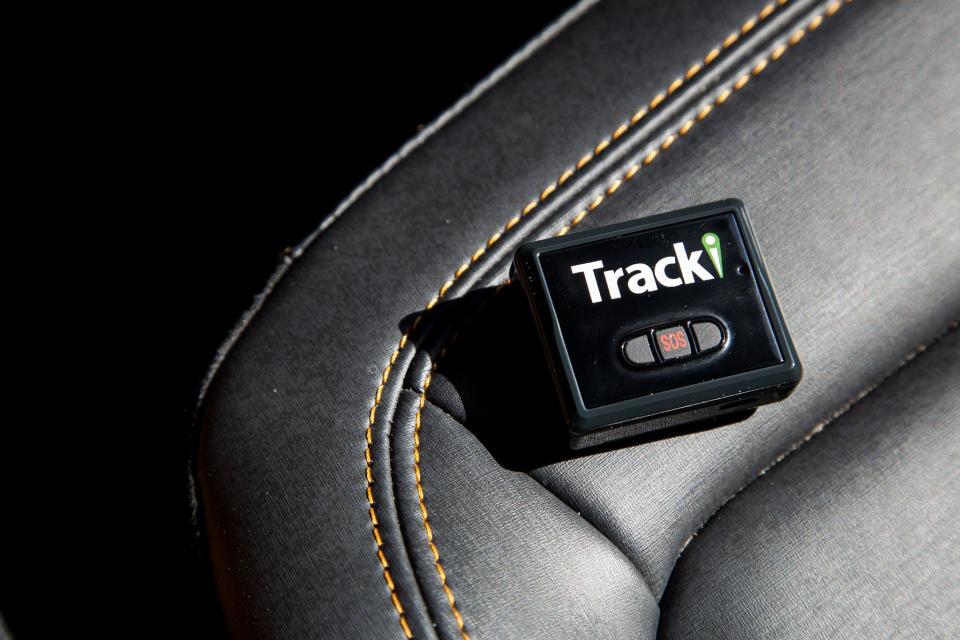
Tracki
amazon.com
$9.88
Gannon BurgettLandAirSea 54
For those looking for a straightforward tracker, the LandAirSea 54 is our pick. Keeping it simple, LandAirSea only offers the three standard alerts: speed, battery, and geofencing. In spite of its simplicity, there are plenty of reports that can give you clarity on the whereabouts of your item within any specified time.
The app is rather plain but no sweat to navigate. We especially enjoyed the historical playback feature, which allows you to view your trips in intervals. While we found the email alerts to be dependable, the push notifications were fickle at best.
Alerts:
Speed
Battery
Geofence
Key Features:
Waterproof
Internal Magnet
Historical Playback Feature
Dark Mode Options (to reduce flashing lights)
ShareSpot (allows you to share location with designated contacts)
Customizable Subscriptions
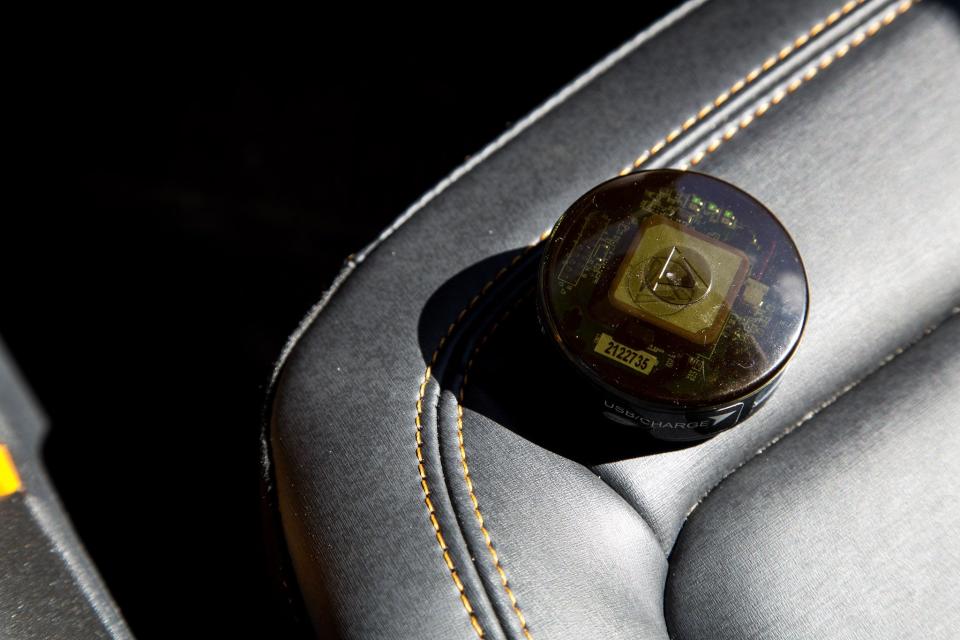
LandAirSea 54
amazon.com
$19.95
Gannon BurgettApple AirTag
The Apple AirTag isn't technically an automotive GPS tracker, but through Apple's Find My network, it's easy to keep tabs on your car.
There's no option for geofences or departure notifications, but through Apple's iCloud web interface, it's possible to track your vehicle as long as it's in proximity to someone using an iPhone or iPad running iOS 14.5 or later. Drivers who aren't in the owner's network may also be alerted to the AirTag's presence, undermining its stealthiness.
No subscription is required, making this one of the more affordable options out there—even if that comes at the expense of more precise tracking features and alerts. As a bonus, the battery life is fantastic, with an AirTag able to work up to a year on a user-replaceable CR2032 coin cell battery.
It's also available in four-packs ($82.99 at Amazon)
Alerts:
N/A
Key Features:
No Subscription
Year-Long Battery Life
Compact
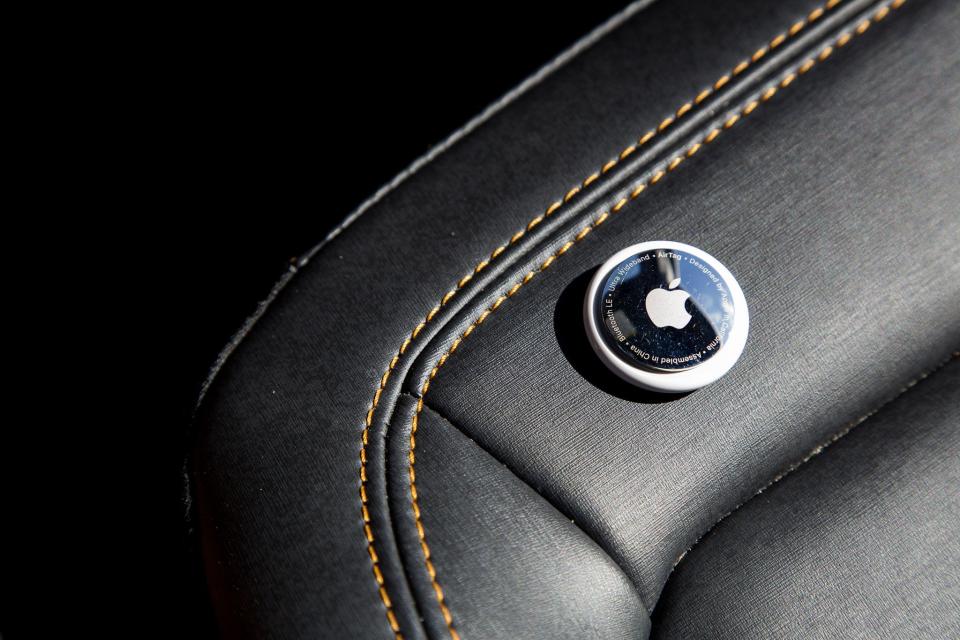
Apple AirTag
amazon.com
$24.00
Gannon BurgettSpytec GL300
The battery-powered Spytec GL300 is one of the more capable tracking units we tested. While it's designed for fleet-level tracking, it's also intuitive enough to use for personal needs.
Both the web interface and mobile apps (Android, iOS) are simple to navigate. While setting up alerts requires a learning curve, the push notifications were fast and reliable, updating within seconds of entering and exiting the geofences we set up.
The Spytec is IPX5 compliant, meaning it can handle the elements should it be mounted outside the vehicle. The integrated 2600mAh Li-Po battery can power the device for seven to 10 days, based on two hours of movement per day; in Standby mode, it can go up to 25 days on a single charge.
Alerts:
Speed
SOS
Low Battery
Geofence In/Out
Trip Start/Finish
Charging Start/Stop
Online/Offline
Key Features:
IPX5-Rated
North America Coverage
SOS Button
Battery Life of Seven to 10 Days
Cancel at Any Time (Unless on Annual Plan)
Android, iOS Compatible

Spytec GL300
amazon.com
$14.95
Gannon BurgettBrickhouse Security LiveWire Volt
Brickhouse Security's LiveWire Volt proved to be the best hardwired option in our testing, reporting back reliably with the geofences and other alerts we set up.
Its hardwired design means you don't have to worry about battery life, and its extensive options for alerts and notifications make it one of the most versatile options we tested. That said, there is a learning curve to setting up notifications.
Alerts:
Speed
Alarm
Connection Loss
Geofence
Maintenance
Key Features:
Hardwired
IP67 Rated
Temperature Sensor
Humidity Sensor
4G Coverage across North America

Brickhouse Security LiveWire Volt
amazon.com
$19.95
Gannon BurgettOptimus 3.0 GPS Tracker
This device isn't for keeping tabs on your teenager's car or a grandparent's whereabouts. The Optimus 3.0 is an industrial-grade GPS tracker with features ideal for keeping tabs on fleet vehicles.
The device itself is fairly straightforward to turn on and set up, but both the online and mobile interface proved convoluted. The back end is clearly designed for detailed fleet management, and the reporting is far more detailed and thorough than the typical driver would need.
Notifications were reliable, and the transparent number of alert types you can define is impressive, but it seems excessive for all but the most commercial of uses.
Alerts:
Harsh Acceleration
Harsh Braking
Harsh Cornering
Lost GPS Signal
Low Battery
Movement
Overspeed
Power Not Available
Schedule Alert
Key Features:
Extensive Reporting Options
One-Minute Reporting by Default (up to every 10 seconds for no additional cost)
Standby Mode

Optimus 3.0 GPS Tracker
amazon.com
$29.95
Gannon BurgettKayo GPS Tracker
The Kayo GPS Tracker didn't excel in any one area and lacks the detailed reporting and notification alerts of other trackers, but it did prove reliable in real-time tracking. At just $5/month, it was also the cheapest subscription of the bunch, with no separate activation fees or annual contracts.
The Kayo uses an integrated SIM card that works within the United States, and the company offers a 14-day free trial. In addition to reliable real-time tracking, you can also set up manual maintenance reminders within the app so you won't forget the last time you rotated your tires, changed your oil, or swapped out your air filter.
We would've liked to see a geofence function and more robust alerts, but this bare-bones approach does keep cost and complications down. The Kayo mobile app (Android, iOS) is available to download for free.
Alerts:
Vehicle Low-Battery Alert
Check-Engine-Light Alert
Tamper Alert
Key Features:
Real-Time Tracking
DTC Scanner
Maintenance Reminders
Trip History

Kayo GPS Tracker
amazon.com
$89.99
Gannon BurgettHow We Evaluated Car GPS Trackers
During this test, our office resembled a hacker hideout from a heist film. With each interface pulled up across several screens, and every app running, we set out to determine the following parameters:
Reliability for triggering speed and geofence alerts
Data and features the tracker provides
Ease of use
To test alert reliability, we set each tracker with a geofence around our office in Ann Arbor. Next, we set each to notify the team whenever we exceeded 65 mph. Additional alerts that we set—but varied from tracker to tracker—included hard braking, rapid acceleration, harsh cornering, and fuel levels. Finally, we installed the trackers into a Ford Bronco, where tester Collin Morgan ran through the gamut of tall city buildings, underground-parking ramps, highway driving, and tunnel runs.
During his route, Collin Morgan triggered as many alerts as possible and called us whenever he did. While Collin drove the Bronco, we furiously recorded alerts and monitored each device for signal drops back at the office. Dozens of emails and text messages later, we were impressed to find we never witnessed a drop of signal on any of these trackers, even when the Bronco went five stories underground.
To evaluate all the data and features each tracker offered, we scoured the apps and desktop versions of each, taking notes on what types of alerts could be triggered, what reports could be run, and methods of notification (SMS, email, or app).
We ran a tiered approach to our ease-of-use evaluation. First, Katherine Keeler spent several days familiarizing herself with the interfaces. The second round came on testing day, when Gannon Burgett assessed the apps as a complete newbie. After that, we compared notes on the user interface and its learning curve.
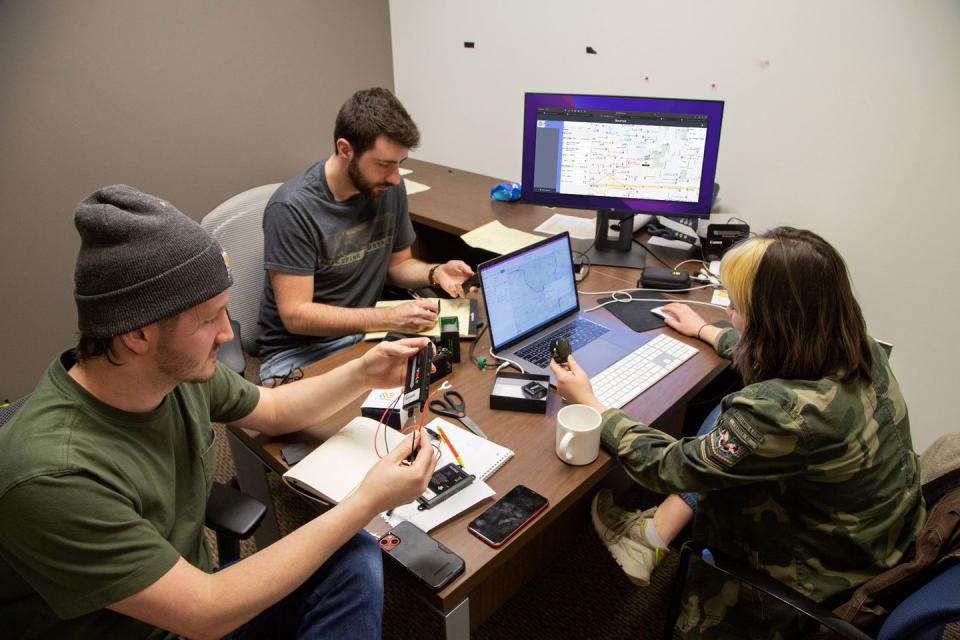
FAQs
What is the best way to track my car?
OBD-II port-powered GPS trackers offer extensive data and draw power from the vehicle, eliminating the need for charging. Hardwired trackers are more discreet and also don't require charging. Internal battery-powered trackers can also be used, but have a limited power lifespan
Is it legal to install a GPS tracker on someone else's vehicle?
Installing a GPS tracker on someone's vehicle without their consent is illegal in most states. If you suspect this has occurred, check the OBD-II port, look for suspicious wires from the battery, and inspect other areas like under the seats, wheel wells, and dashboard. If you find any suspicious devices, contact the police immediately.
Where do you put a GPS tracking device on a car?
The placement depends on the type of tracker you use. OBD-II trackers are limited to your OBD-II port. Hardwired trackers will likely connect directly to your car's battery, and battery-powered trackers can be placed anywhere you prefer. For battery-powered trackers, many come with a strong magnet and are waterproof if you decide to track the vehicle from its exterior.
Do all car GPS trackers require a monthly fee?
Most do, and the ones that don't typically lack essential features. Expect to purchase your tracker along with a subscription plan.
How long can a GPS tracker last on my car?
OBD-II-powered and hardwired GPS trackers can last as long as the vehicle's battery—which can be many years as long as the car is driven at least every couple of months. In contrast, internal battery-powered trackers have a limited lifespan, which depends on how often the tracker reports its data—a setting that the user can adjust. The lifespan can range from just a few days to a few months.
Will I receive a discount on my insurance if I have a GPS tracker on my car?
Using an aftermarket GPS tracker won't necessarily get you a discount on your insurance, but it's always worth asking your insurance provider. Many insurance companies use devices, like Progressive's Snapshot, that utilize GPS and driving habit-tracking to determine optimum rates. But it's important to remember that that tracking information is monitored by, and belongs to, the insurance company, and they reserve the right to raise your rates should you drive recklessly.
Will a jammer be able to block my GPS tracker's signal?
It is possible that a high-quality signal jammer may block your GPS signal. None of the devices tested here claimed to be immune to signal jamming, and we didn't test for that here. While we wish it weren't true, a determined thief with the right tools is a risk that's hard to prepare for.
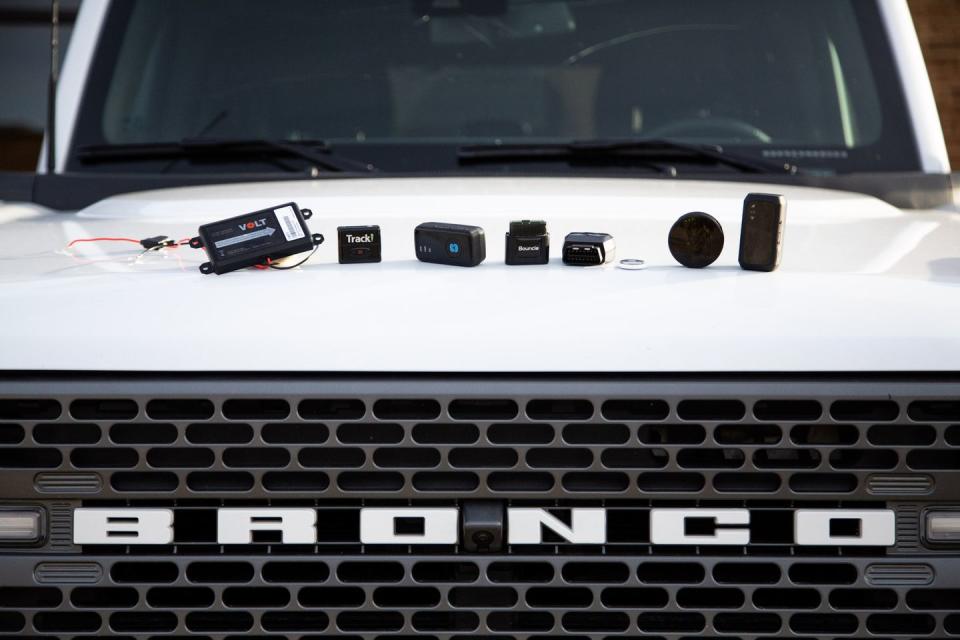
Why Trust Us
Hearst Autos combines the talent, resources, and expertise of three of the largest, most influential automotive publications in the world. The Gear Team has tested a wide variety of automotive products, parts, accessories, and gear, such as dash cams, portable jump starters, and snow brooms and ice scrapers. We get our hands on each and every product we test. Most are purchased; some are supplied by manufacturers.
Hearst Autos doesn't need to game algorithms for traffic or promote lousy products. We're more concerned with our legacy, our reputation, and the trust that our readers have in Car and Driver, Autoweek, and Road & Track to deliver honest opinions and expert evaluations.
Visit our Tested & Trusted page to see the very best in automotive gear. Read more about our product testing and evaluation process here.

You Might Also Like

 Yahoo Autos
Yahoo Autos 